Dandelion Wine
[Book]
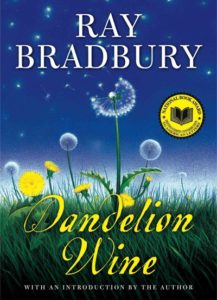
view/request
Dandelion Wine is Ray Bradbury’s novel of a child’s summer in a small Illinois town. In the first few pages of the novel Douglas Spaulding, the twelve-year-old protagonist, is stuck by the alarming thought that he is alive, “I’m really alive! he thought. I never knew it before, or if I did I don’t remember!”
This is the first of many revelations Douglas will have over the course of the summer. Douglas’s summer is a time of brightness and joy to be cherished, but still, by its end he has transformed himself, having struggled with issues of identity, age, fear, and mortality.
Like so many of Ray Bradbury’s novels, Dandelion Wine is episodic, essentially a collection of stories many of which can stand alone. Douglas features in many of these stories, but several stories feature other characters, among them: Leo Auffmann, who attempts to build a happiness machine; Helen Loomis, who is 95 and never married, but shares a mutual admiration with the much younger Bill Forester; and Mr. Jonas, the maybe magical and certainly mysterious town junkman who heals Douglas when he is ill.
Dandelion Wine reads quickly but offers much worth dwelling on. The stories are memorable, the setting and characters are both characterful and yet sufficiently loosely described so as to seem universal, and the writing is engagingly snappy and colorful. Forbes Library’s Afternoon Book Discussion discussed Dandelion Wine in August and we had a very lively, enjoyable discussion. Very much recommended.
Reviewed by Ben
Ball of Fire
by Howard Hawks
[DVD]
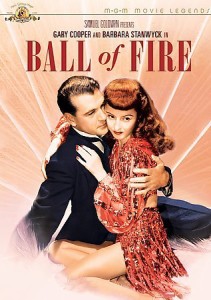
view/request
In this delightful romantic comedy Gary Cooper plays Bertram Potts, the youngest of eight professors who have lived together for years, devoting their time to the production of a new encyclopedia. When a trash collector asks the professors for help answering questions for a trivia contestd Bertram is baffled by the garbageman’s language and realizes his article on American on slang is badly out of date. In order to correct this he must leave his reference books behind in order to do some research in the field.
Bertram’s field research brings him in contact with Sugarpuss O’Shea, a witty and jocular nightclub performer portrayed by Barbara Stanwyck. Sugarpuss has no interest in helping Bertram with his research until her mob-boss boyfriend gets in trouble and she needs a place to hide from the police. What better place to hide than among these quiet and respectable professors?
Having taken refuge with the encyclopedists, Sugarpuss delights in teasing the stodgy Bertram and soon makes friends with the other professors (who, unlike Bertram, enjoy her company from the beginning). Bertram, however, worries that her presence will interfere with progress on the encyclopedia. “Now, when the Foundation launched our vessel”, he proclaims, “it very wisely followed an old rule of the sea, no women aboard. It chose a crew of single men with nothing to distract them from the course they were to sail.” Sugarpuss recognizes this as nonsense, but can’t risk a fight under the circumstances. Still, it is with evident sarcasm that she offers “to sit on her legs”.
Bertram almost redeems himself when he replies, “Make no mistake, I shall regret the absence of your keen mind”. However, he continues with, “unfortunately, it is inseparable from an extremely disturbing body.”, a statement which comes across as almost redeeming—Bertram wasn’t concerned for the sake of the other professors, but for himself. Fate will, however, keep Sugarpuss and the professor together, and despite flying wisecracks and bullets (remember the mob-boss boyfriend?) they soon grow to enjoy each other’s company.
Stanwyck’s Sugarpuss is refreshingly strong, independent, and easily the most complex character in the film. Gary Cooper’s Bertram is understated and reserved. Many of the characters come across as cartoonish, which is just what you want from the supporting characters in a screwball comedy. The dialogue is fast and witty and, of course, full of period slang, familiar and not.
By the way, Ball of FIre would later be remade as the musical A Song is Born starring Danny Kaye. The dialogue in the two films is in large parts identical, despite the different scenario and very different portrayals. Folks who have seen A Song is Born will be relieved to know that in Ball of Fire the dialogue actually makes sense!
Reviewed by Ben
Tagged: Billy Wilder, Comedy, Drama, Feature film, Howard Hawks, Jazz, Romantic comedy, Slang
Raffles: Further Adventures of the Amateur Cracksman
by E. W. Hornung
[Book]
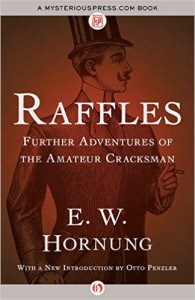
view/request
Did you know that Sir Arthur Conan Doyle’s brother-in-law E. W Hornung was also a successful author? Hornung’s hero, A. J. Raffles is a “debonair, witty and cricket-loving gentleman thief” too selfish to be a Robin Hood, but too noble to steal from those he feels can ill-afford it, and patriotic enough that he goes to war for his country and once, after making suitable precautions to avoid self-incrimination, he arranges for the spoils of a particularly splendid heist to be a gift to the queen.
Like those of Sherlock Holmes, the exploits of A. J. Raffles are told from the perspective of a devoted friend and accomplice. In place of Doctor Watson, Raffles has Harry Manders, more usually known, at least to his criminal friend, as Bunny. Bunny Manders is a struggling journalist and surprisingly innocent given his enthusiasm for his scofflaw friend. At the beginning of Raffles: Further Adventures of the Amateur Cracksman, Bunny has recently been released from jail, and Raffles is presumed dead. Of course, we soon learn that they both have plenty more adventures ahead of them.
Hornung dedicated his first set of Raffles stories to his brother-in-law, and Doyle was suitably impressed, writing that “there are few finer examples of short-story writing in our language than these.” He did not however, approve Hornung’s choice of subject, however: “You must not make the criminal a hero.” Readers, however did not seem to mind: Raffles was the second most popular fictional character in the early twentieth century, second only to Sherlock Holmes.
Reviewed by Ben
Tagged: Crime, Criminals, Fiction, Short stories
The Name of the Wind
by Patrick Rothfuss
[Book]
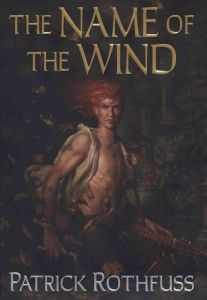
view/request
This is a fun book, the kind that pulls you in and keeps you turning the pages. If you read it in a public place, however, you are likely to be interrupted by fans of the book who cannot help themselves and are eager to share their enthusiasm. Once I was even told, “I’m so jealous that you are reading it for the first time! I will never get to do that again!”
The Name of the Wind is a fantasy novel, and, to tell the truth, much of its plot sticks close to the cliches of the genre. A young boy discovers an aptitude for magic, learns all he can those around him, overcomes many obstacles, is accepted into a university where he excels beyond expectation, and goes on to do great things. And the hero, Kvothe, must, of course, confront a great evil, one that he takes seriously while those around him consider it only a fairy tale. Unlike most such stories, however, Kvothe, is a musician, and his changing relationship to his music is important throughout the book.
The world is richly built, full of detail, and the mechanics of its magic feel far more convincing than those in many other fantasies. The story is told from the perspective of an older Kvothe, now an innkeeper, who has done much since the events of the story he tells, but who has much more to do and learn as well. (This is the first book in a trilogy, after all.) Upon finishing the book you are left hungering for two stories—what happened to the young Kvothe in the stories, and what will happen to the innkeeper Kvothe, who you sense has much, much more in store for him.
Reviewed by Ben
Tagged: Fantasy
Catherine the Great: Portrait of a Woman
by Robert K. Massie
[Book]
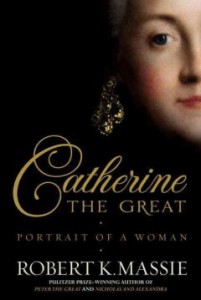
view/request
This is a detailed biography of Catherine II, from her childhood as a minor princess in a small German principality to her long reign as empress and autocrat of all the Russias and one of the most powerful women in Europe. My favorite part: when Catherine donned a uniform and the led the army to arrest her husband and seize his throne! And what lover of books and libraries can resist the story of how Catherine made Denis Diderot her personal librarian? When Catherine heard that the great encyclopedist had run into financial difficulties and wished to sell his library, Catherine bought the entire collection for more than his asking price, insisted that the books stay with Diderot in Paris, and paid him a handsome salary so he could continue his work.
Catherine’s life was full of court politics, international intrigues, subtle power struggles, and secret plots, but also scholarly pursuits, intimate correspondences, lavish parties, extravagant gifts, and love affairs, secret and private. Massie pays great attention to Catherine’s personal life—the excerpts from her love letters are wonderful to read.
Massie’s approach is direct and readable, with chapters based upon subject matter more than chronology.In this book he provides an interesting slice of European and Russian history, a fascinating glimpse of 18th century politics and the influence of Enlightenment thought on a powerful monarch, and an appealing tale of personal struggle and transformation.
Reviewed by Ben
Tagged: Biography, Europe, Russian history
Dodger
by Terry Pratchett
[Book]
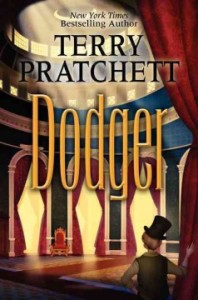
view/request
Dodger is the latest novel by Sir Terry Pratchett, best known for his satirical Discworld series of fantasy novels. Pratchett’s usual wit and love of language shine through in this historical piece set in Victorian London and with a cast of characters that includes Charles Dickens, Benjamin Disraeli, Angela Burdett-Coutts, and Queen Victoria.
Dodger takes place above and below London, with the city’s ancient Roman sewers playing a prominent part. Much of the drama comes from the meeting of the upper and lower classes, the rich and poor, and the politics of the street vs. the politics of the state.
Pratchett has, very consciously, taken liberties with the setting and refers to the work as a historical fantasy, not a historical novel. The most obvious example is the inclusion of the almost certainly fictional Sweeney Todd. Less noticeable to most readers will be the the adjustment to the lives of Sir Robert Peel and John Tenniel whose careers did not, in fact, overlap as suggested in the novel. These changes may bother some, but if you take them in stride you will find Dodger to be a very enjoyable adventure story brought to life by its rich setting and colorful language.
Reviewed by Ben
Tagged: Adventure, Fiction, Historical fiction, Humor, London
Midnight in Peking
by Paul French
[Book]
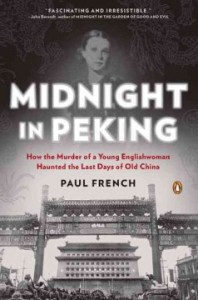
view/request
In 1937 foreigners and native Beijinger’s alike were shocked when the mutilated body of a young woman was found just outside of of Beijing’s Legation Quarter. Clearly, a terrible crime had been committed, but what had happened? The investigation was complicated by the bureaucratic system that made it difficult for law enforcement in the Legation Quarter and in Chinese Beijing to work together and the detectives in charge of the case struggled with a lack of information and communication—and what seemed all too often to be pure obstructionism from above. Paul French’s Midnight in Peking offers a fascinating glimpse of China at beginning of the Second World War, a time when powerful Europeans were leaving China, and many refugees were arriving in Beijing and nearby cities, fleeing from the USSR and Nazi Germany, and from the increasingly hostile and militaristic presence of the Japanese within China.
French’s narrative follows both the official investigations, and the unofficial investigation conducted by the victim’s father. There are some surprising twists along the way, and French takes advantage of them to keep the reader on her toes. An engaging read, but not for the squeamish or those who prefer to read stories in which justice is fulfilled.
Reviewed by Ben
Tagged: China, History, Non-fiction, True crime
How Music Works
by David Byrne
[Book]

view/request
“I think I managed to give a sense that the world of music is wider than my personal experience, but my experience figures in here too”, David Byrne writes about his recent book How Music Works, and this statement gives you a very good idea of what you will find in this very enjoyable book. How Music Works explores the world of music through the experience of one musician’s experiences and wide ranging thoughts. As a result, it is neither a comprehensive book on the nature of music nor a complete biography of its author, though it combines elements of both. Byrne explores the history of music and musical thought, the influence of technology and economics on music, the role of music in society, and the future of the music industry. Along the way we learn much of Byrne’s career, his own approach to music, art, and performance in general.
Byrne is an excellent writer, and a man with wide ranging and interesting ideas. Reading How Music Works is a pleasure, and left me with an increased urge not only to explore more of his music and to read more of his writing (Forbes Library also owns his Bicylce Diaries), but most of all, to make more music of my own. It is, above all, David Byrne’s unending enthusiasm for everyday creativity and for the participation of everyday people in the world of music that will make the greatest impression on you. A great book which will be enjoyed by music lovers of all types.
Reviewed by Ben
Tagged: Music, Non-fiction, Pop music
Dr. John Teaches New Orleans Piano
[DVD]
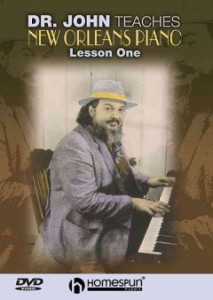
view/request
I didn’t learn to play New Orleans style piano watching this DVD. You might, if you are already a competent pianist, or simply more patient than I am, but this is a rewarding movie whether you intend to become rock and roll pianist or not. Dr. John is an amazing musician; when he plays it looks easy, but just try following along at the piano!
Dr. John looks relaxed (though often worried, as if something else is on his mind). At times he hardly seems to move—but the piano keys move, quickly, and in syncopation, and the music is wonderful. He plays Frankie and Johnnie, C. C. Rider, Blueberry Hill, and others, playing each in some flavor of the New Orleans Rock and Roll, Fats Domino inspired, playing for which he is known. We are given an overhead view of the piano keyboard, as well as a more conventional angle from the side, which lets you really appreciate the fluidity with which the Doctor plays, and is invaluable if you want to try playing his licks yourself. He breaks many of the tunes down, playing the left hand or right hand parts separately, slowing down the tempo, or demonstrating alternative turn around and improvisations. He discusses what riffs are easiest when accompanying your own voice, and briefly describes the interaction between the pianist and the other members of the band.
I really enjoyed this DVD. In fact, I think I’ll probably revisit it in a few months—after I’ve practiced the piano a bit more!
Reviewed by Ben
Tagged: Documentary, Instruction, Music, Rock music
The Artist
[DVD]
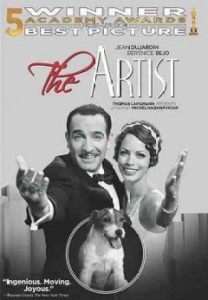
view/request
I had heard great things about Michel Hazanavicius’ award winning silent film The Artist. How could I not have? The film won five Oscars, three Golden Globes, and a host of other awards and critical praise. And yet, I was nervous about seeing the film. A silent film made in 2011? Was it just a gimmick? Just a superficial imitation of an earlier error?
There is no doubt that the film is intended as an homage to older films. The film is presented in black and white and everything from the acting, to the intertitles, the score, and even the aspect ratio of the screen is designed to resemble the films of the silent era. And yet, the film feels quite modern, in part, because of the self-awareness it brings to its imitation, but also because the film looks at Hollywood in the late twenties in a manner which could only be done in hindsight. In many ways The Artist has more in common with Singing in the Rain, another great film about Hollywood’s transition to talkies, than it does with any silent film.
And, much as with Singing in the Rain, you don’t actually have to be familiar with films of the silent era to appreciate The Artist. The film is well made, the acting is great, the period costumes are a joy. The characters are larger than life, but sympathetic and likable. They are caricatures, but this is so well done as to be an asset.
I really enjoyed The Artist. It’s funny, stylish, and clever. Recommended for film lovers or anyone looking for something a little different.
Reviewed by Ben
Tagged: 1920s, Feature film, Silent film
Patternmaster
by Octavia E. Butler
[Book]
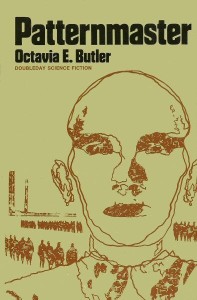
view/request
Folks have been recommending that I read Octavia E. Butler for some time. I’ve received recommendations from friends that know I like Ursula Le Guin and have told me that I would therefore like Butler’s writing as well, and I’ve also received recommendations from friends who have said, “Oh, you like science fiction. I don’t read much science fiction, but I just read this book by Octavia E. Butler…”.
I picked up my first novel by Octavia E. Butler, Patternmaster, last Thursday, and I finished reading it over the weekend. Needless to say, I enjoyed it! In this short novel, Butler introduces us to a post-apocalyptic world in which humans are divided into a complex system of social castes and warring factions based upon the powerful mental powers of some, and the disease induced mutations of others. The story, of a student who leaves school to find himself in conflict with his own power hungry brother, is relatively simple, but the detailed world in which it takes place makes it feel like part of something much bigger.
Reader’s of Ursula Le Guin’s fiction will recognize themes of class, gender, and sexuality in Butler’s writing, as well as a similar approach to speculative fiction that is based on rigorous world building and avoids the stereotypes of the genre. The struggles depicted in Patternmaster are, however, more violent, and the cast more power hungry, than in Le Guin’s writings. If you like Ursula Le Guin and don’t mind the a story with some loose ends and some violent passages, you should give Patternmaster a try.
Reviewed by Ben
Tagged: Dystopia, Fiction, Science fiction
The Story of English in 100 Words
by David Crystal
[Book]
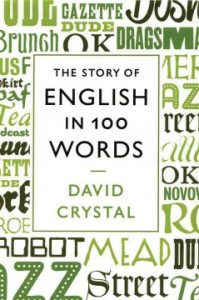
view/request
The Story of English in 100 Words, by Welsh linguistics professor David Crystal, is a refreshing word book. With short easy to read chapters, it is a quick read, especially once you have caught Professor Crystal’s contagious enthusiasm.
I say The Story of English in 100 Words is refreshing in part because it is an easy enjoyable read, but also because it is different from other word books. Too many word books are based on anecdote and folk etymologies. You won’t many of those in The Story of English. Instead, you will find the stories of words and revealed by known facts. When did a word first appear? How was it spelled? How was it used at the time? How did its meaning change? What words were used similarly? There may be some guessing involved, but the answers to these questions are based on research, and we learn much about the English language in answering them.
Does this approach sound overly academic? Don’t worry. The examples are surprising and amusing, and the text is never bogged down in details. Most of the chapters are just a couple of pages, and include many illustrative examples. The examples are drawn from throughout the history of the language, from Old English, to new Internet coinages. This is a book about the history of English, and therefore a book about how English grows and changes. A very fun read!
Reviewed by Ben
Tagged: Language, Non-fiction












